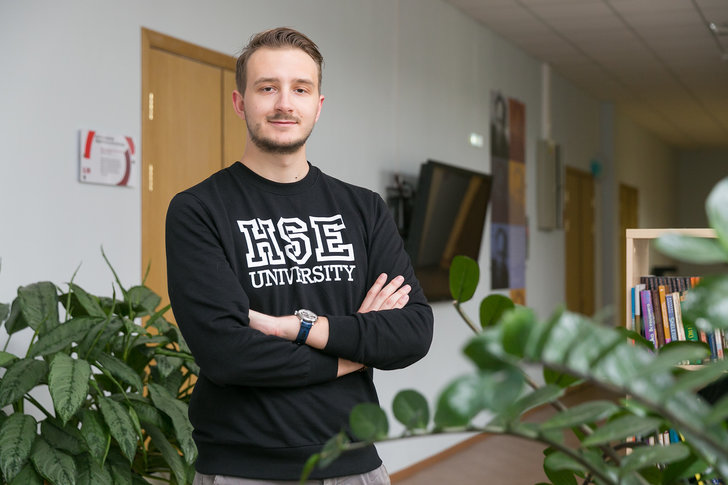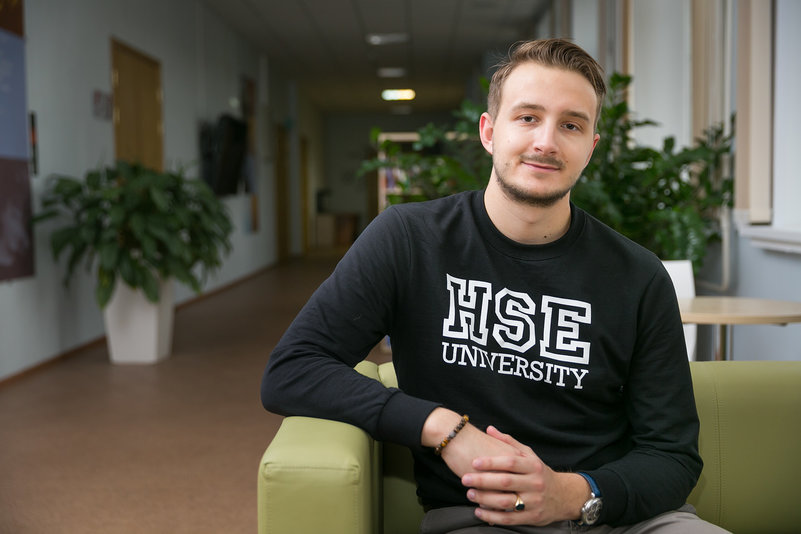'Every Day Something Interesting Happens'

Amand van Rossum, student of a MA Programme in International Relations, has been part of the International Students’ Association since its foundation, first serving as its Vice-Chair and then becoming the Student Advisor and PR Officer. He has talked to HSE News Service about international students’ life in Moscow and the role International Student Association intends to play in helping students better adapt at HSE.
Why study in Russia?
There are several categories of international students, as I’ve seen. First, there are international students who already have a link with Russia. For example, their grandmother lived here for a while, or they want to figure out where their roots come from and want to live there for a while. Then there are people who have a fascination for the country, the people, the language, and the culture. They might have already finished their Bachelor’s, studying, for example, Slavic languages, and they want to spend some time in Russia. There are also people who have academic interest in the university. A friend of mine studies economics and statistics and he is a big fan of Russian economic scientists and mathematicians. He believes they have a very high level, and that’s why he decided to come here. Finally, there are other people who are just interested in going on an adventure or having a very interesting life here, because, from what I’ve noticed every day something interesting happens. There’s not a day that goes by when I don’t think: ‘Wow, it’s so different, or this is interesting’, or that something surprises me. And I think that’s the same for other international students.
I definitely advise all international students to try to learn the language even if they plan to enrol in an English-taught programme
Overcoming the language barrier
I took the Preparatory Year to learn the language and it was really helpful. The programme is very effective – it helps to achieve B1 level in Russian. My master’s programme now is taught both in English and in Russian. So, most of my lectures are in Russian but I can do big essays in English. Some students who do the Preparatory Year go on to enrol in Russian-taught programmes. From what I hear, the first year of studies in this case might be challenging. You have to put a lot of extra time and effort into it, but it’s manageable. At the moment, I am not taking additional Russian as a Foreign Language courses. But there is such an option for international students – you can follow one semester for free, and if you want more, you have to pay extra.
I am very lucky in that I speak Russian - I can interact with people, laugh with people in cafes, and get to know people without them having to switch to English, which makes my stay a lot more fun
I definitely advise all international students to try to learn the language even if they plan to enrol in an English-taught programme. Students who are fluent in Russian can integrate quite easily, but the international students who have limited Russian language proficiency, or maybe don’t even speak Russian at all, are more forced to speak with either the Russian students who speak English, or just the international students. I am very lucky in that I speak Russian - I can interact with people, laugh with people in cafes, and get to know people without them having to switch to English, which makes my stay a lot more fun.
Dealing with cultural differences
Besides learning Russian, it’s important to have realistic expectations. People who think that their life would be the same as in their home country and that they wouldn’t face any big issues, might have quite a hard time. There is also a moment when you just have to go through it. I feel like I’ve been through several levels of culture shock already. The longer I’m here, the more I see how the entire society works, and the more it surprises me, and the more I realize that the cultural differences are very apparent.

For instance, it took me a long while before I really became friends with some of the Russian people that I know. In the Netherlands people are distant, but here it’s even more so. You need to show that you are trustworthy, a good person, before they take you up in their friend circles. In the Netherlands, they might say, ‘hey, let’s do this, let’s do that’, and then you can be friends very quickly, and here it just works very differently. Moreover, when you walk in the streets, there is less interaction with people, and there is a bigger chance of getting a negative comment rather than a positive one. Everyone seems to be in a hurry, nobody really has time. You don’t make small talk with people that much. If you’re very used to that, that might be a big difference.
What else to expect:
The structure of classes is different in Russia
The education is quite intense. There are more lectures here than in the Netherlands, for example. You have more contact hours, which means that a large part of the day is spent at the university, instead of self-study. It’s important to plan your day well.
You will have roommates if you live in the dorm
It’s a good opportunity to learn to adapt to someone else’s culture. International students typically live in centrally located dormitories, which is very convenient since it’s easier to get to classes. So, your roommates might not necessarily be Russian. I have great roommates, which makes living together actually quite fun.
International students need a work permit if they wish to get a job
If you don’t have a permit, you can work part-time at the university – as a research or teaching assistant.
Some food might be new
While potatoes are popular in many countries, dishes like ‘kasha’ (buckwheat and other varieties) might be new to some. Make sure you try borscht! If you prefer your national cuisine, there are all kinds of restaurants in Moscow to choose from. It’s also possible to buy different food you are used to in supermarkets or specialized shops, but you might need to spend some time finding the best place.
The amount of light in winter is different
It’s a northern country after all and sometimes it is dark early. This doesn’t have that much of an effect on me, though.
Moscow is a huge city
There is always something to do, so you can be overwhelmed with the amount of stimuli that you get. The city never sleeps and life keeps on going and going, no matter what time of the day. There are many interesting events every day. I think it is great, but for some it might be a hurdle. You have to be able to focus on your studies and not get easily distracted.
International Students’ Association at HSE
When the International Students’ Association was formed, the biggest difficulty for us was figuring out the structure of the Higher School of Economics! We’ve noticed that it’s a university with more than 20,000 students and there is a very complicated system which operates the university. So, it’s very important to form connections with people from different administrative departments to get things going. Once you’ve had those connections and you want to organize something, you know where to find the help that you need, or the people who can advise you on who to talk to about a particular issue.
We really want our council to start working properly. I had two years of previous experience working on student councils. It was helpful in launching things here - we established a system of meetings, how we are taking minutes, how we create events, etc. So, we laid the foundation for our work and now that we have enough people on the council, we can actually start doing the things that we have in mind. We have a great new board, who are going to lead it, and with my experience, I will support them wherever I can. We should make ourselves known - people often confuse us with ESN. Now we plan to actually make a name for ourselves.
We’ve noticed that international students don’t like it when they can’t interact much with Russians. And the reverse is also true - Russian students would like to interact more with internationals. So, International Students’ Association has been trying to address this issue. One thing that we aim to do is organize events which are not specifically for Russians and not specifically for the international students. The idea is that at such joint events people who speak Russian and English can help others, who probably don’t speak the language that well, a little bit with starting a conversation.
Besides learning Russian, it’s important to have realistic expectations. People who think that their life would be the same as in their home country and that they wouldn’t face any big issues, might have quite a hard time
Besides, what we are trying to do together with ESN, is set up a central information point, where Russian and English students can get together and where information in Russian and in English would be available. We are only at the very beginning of the project, but it is something we would really like to see realized.
What we also want to do is to have a centralized Google form where people can put in their suggestions and ideas on what they would like to see achieved. We hope that this way we can get through to students. What I’ve noticed that the international students have a lot of input, but they don’t know where to go. We hope that we can give them that platform.

